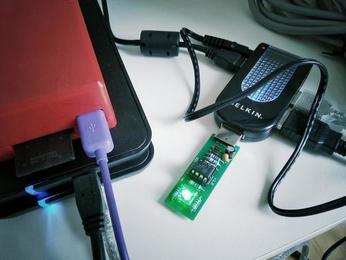Using BlinkStick with Raspberry Pi

Productivity Sauce
Hooking up LEDs to Raspberry Pi's GPIO pins and controlling them using Python scripts is a great and fun way to learn the ropes. For more advanced projects, you might want to consider investing in BlinkStick, an open source USB LED kit that works with Raspberry Pi, or any other machine for that matter. BlinkStick plugs directly into a USB port, which eliminates the need for a breadboard and wires and makes the setup more tidy. The accompanying software can control multiple BlinkSticks, which you can hook up to a USB hub. More importantly, BlinkStick supports a long list of options, and you can put it to a variety of practical and not-so-practical-but-fun uses.
To get started with BlinkStick on Raspberry Pi, you need to install the BlinkStick Python interface first. To do this, run the following commands:
sudo apt-get install python-dev python-pip sudo easy_install pip sudo pip install blinkstick
Run then the sudo blinkstick -h command. If everything works properly, you should see a list of all available options. By default, you have to execute blinkstick commands with root permissions. To fix that, run the following command and reboot Raspberry Pi:
sudo blinkstick --add-udev-rule
So what can you actually do with BlinkStick? For starters, you can use it to visualize CPU usage, and the blickstick command has a dedicated option for that. Run the blinkstick --cpu-usage command, and BlinkStick will change its color depending on the CPU usage (Green = 0%, Amber = 50%, Red = 100%).
Of course, you can put BlinkStick to other uses, too. I'm using BlinkStick with Pygmyfoto running on my Raspberry Pi. Every time someone visits the gallery, BlinkStick blinks with random color. This solution consists of a simple Bash shell script which controls BlinkStick and logs visitor access to the blinkstick.log file:
#!/bin/bash blinkstick --set-color random --blink --repeats 3 blinkstick --set-color random DATE=$(date "+%F %T") echo "Yay! Someone visited your site on" $DATE >> blinkstick.log
The shell_exec ( './blinkstick.sh > /dev/null 2>/dev/null &' ) command embedded into the index.php page triggers the script.
For further info on using BlinkStick and more ideas on how to use this nifty kit, visit the project's GitHub repository. In the meantime, drop by dmpop.dyndns.org/pygmyfoto/ and blink to me. :-)
comments powered by DisqusSubscribe to our Linux Newsletters
Find Linux and Open Source Jobs
Subscribe to our ADMIN Newsletters
Support Our Work
Linux Magazine content is made possible with support from readers like you. Please consider contributing when you’ve found an article to be beneficial.

News
-
Kernel 7.0 Now in Testing
Linus Torvalds has announced the first Release Candidate (RC) for the 7.x kernel is available for those who want to test it.
-
Introducing matrixOS, an Immutable Gentoo-Based Linux Distro
It was only a matter of time before a developer decided one of the most challenging Linux distributions needed to be immutable.
-
Chaos Comes to KDE in KaOS
KaOS devs are making a major change to the distribution, and it all comes down to one system.
-
New Linux Botnet Discovered
The SSHStalker botnet uses IRC C2 to control systems via legacy Linux kernel exploits.
-
The Next Linux Kernel Turns 7.0
Linus Torvalds has announced that after Linux kernel 6.19, we'll finally reach the 7.0 iteration stage.
-
Linux From Scratch Drops SysVinit Support
LFS will no longer support SysVinit.
-
LibreOffice 26.2 Now Available
With new features, improvements, and bug fixes, LibreOffice 26.2 delivers a modern, polished office suite without compromise.
-
Linux Kernel Project Releases Project Continuity Document
What happens to Linux when there's no Linus? It's a question many of us have asked over the years, and it seems it's also on the minds of the Linux kernel project.
-
Mecha Systems Introduces Linux Handheld
Mecha Systems has revealed its Mecha Comet, a new handheld computer powered by – you guessed it – Linux.
-
MX Linux 25.1 Features Dual Init System ISO
The latest release of MX Linux caters to lovers of two different init systems and even offers instructions on how to transition.

